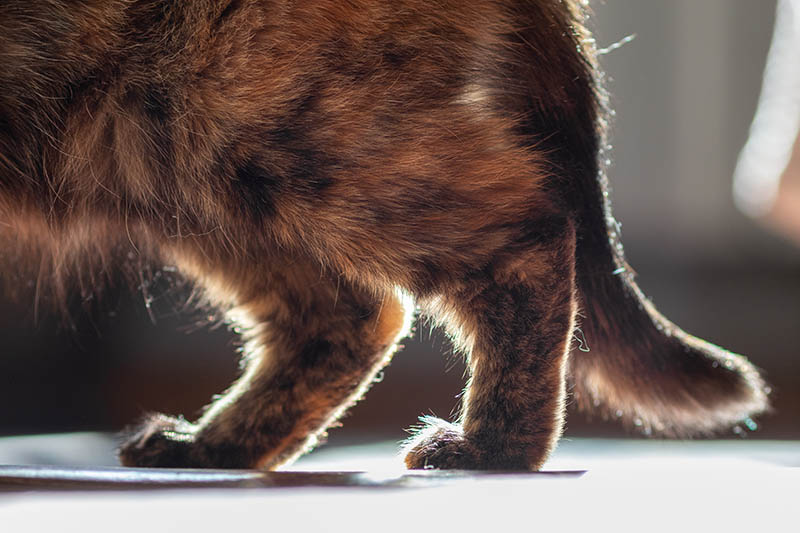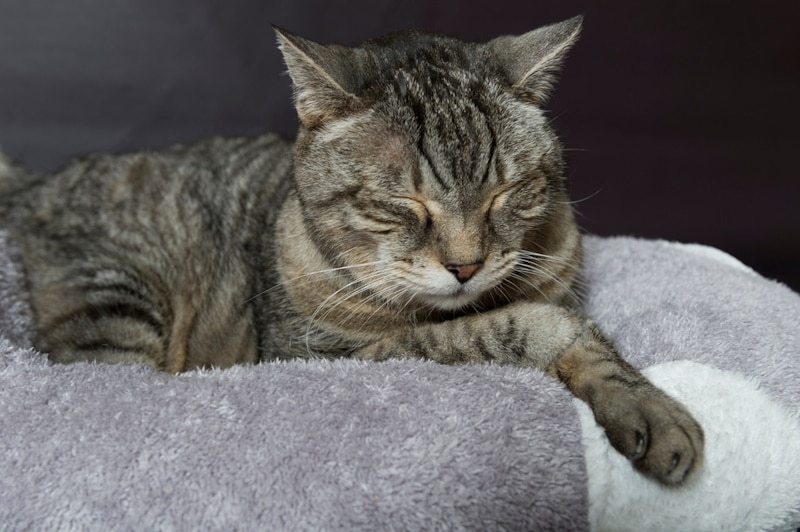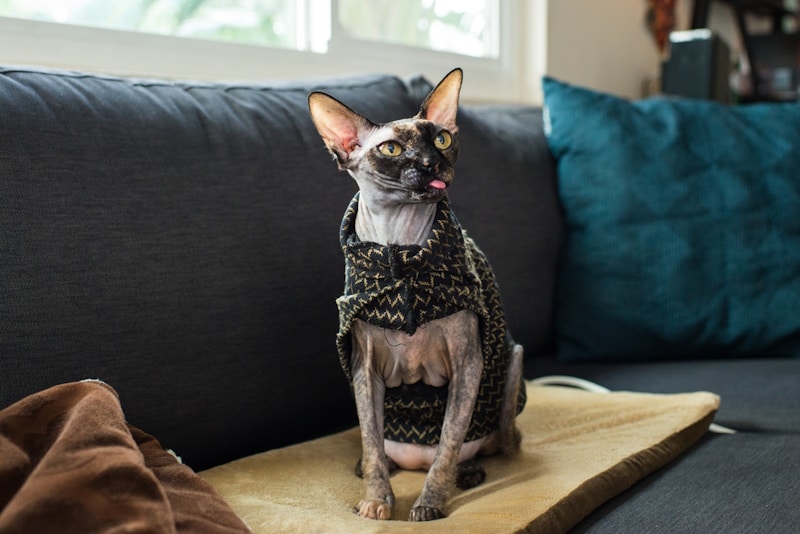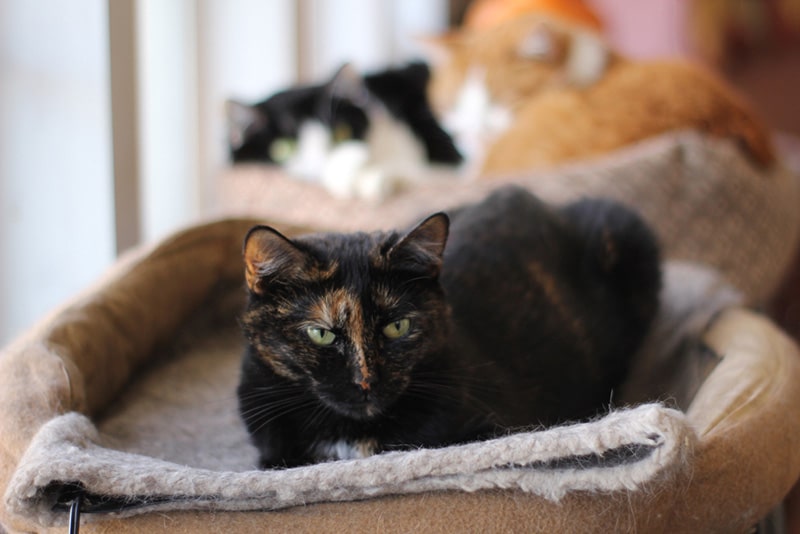Even if our dearest wish would be that our four-legged companions accompany us for as long as possible, the passage of time spares no one, not even our feline friends. Just like us, various health problems can arise in cats as the years pile up. Take arthritis, for instance, which is a common affliction in older cats. Witnessing your once agile and graceful furball struggle with joint pain can be heartbreaking. Fortunately, there are practices that can bring relief to your feline friend, such as incorporating a heating pad.
In this article, we discuss arthritis in cats, the potential benefits and risks of using heating pads to relieve joint pain, and other simple strategies for maintaining the comfort and overall health of your senior cat.
What Is Arthritis in Cats?
Arthritis, also known as osteoarthritis or degenerative joint disease, is a progressive and chronic disease that affects the joints and surrounding tissues. This disease can result in pain, stiffness, and a reduced range of motion for your feline companion. While arthritis is more commonly associated with older cats, it can also affect younger cats, especially those with predisposing factors, such as genetics or previous injuries.

What Are the Signs of Arthritis in Cats?
As you may know, cats are real experts at hiding pain, making it tricky to identify health issues like arthritis early. However, there are subtle signs that may indicate that your senior cat is dealing with joint discomfort.
These clinical signs include:
- Reduced activity and mobility. If your once energetic furball becomes less interested in playtime or starts napping more frequently, it could be a sign of joint pain (but also many other health problems, so watch out for other signs).
- Changes in grooming habits. Due to pain, your cat may have difficulty reaching certain areas for grooming, resulting in a dirtier, dull coat. Overgrooming in specific spots may also indicate an attempt to soothe sore joints.
- House soiling. Arthritis can make it difficult for cats to get in and out of the litter box, so they may use other areas of your home that are easier to access to do their business.
- Limping or other change in your cat’s gait. Observe your cat’s gait and overall posture. Arthritic cats may limp or show stiffness, particularly after waking up or after extended periods of rest.
- Unexpected aggression toward other cats or humans. Pain can change your cat’s behavior, leading to unexpected outbursts of “rage” toward you or your other pets.
What Can Heating Pads Do to Help Manage Arthritis in Senior Cats?
Heating pads, when used appropriately, can offer a certain amount of relief to cats with arthritis. But the superficial heat from this type of device does not penetrate the body to reach deep into the joints, so a heating pad does not have a significant effect on arthritis. However, most cats, elderly or not, seem to find comfort in curling up on a warm cushion or bed. The heat can also help improve blood circulation through stiff muscles, making it easier for the cat to move by reducing muscle tension and soothing joint pain.
According to research, superficial heat therapy—such as the use of heating pads—can:
- Enhance oxygenation in the tissues
- Increase blood circulation
- Reduce muscle spasms
- Improve the flexibility of the connective tissues
- Reduce muscle pain and stiffness

In other words, a heating pad is not a miracle solution that will cure your senior cat of arthritis, but it can provide comfort and pain relief.
But be careful: Using a heating pad that is too hot or poorly insulated can cause burns to your pet, so take proper precautions. It’s crucial to only choose heating pads specifically designed for pets; most human heating pads can get too hot for your cat’s sensitive skin.
Other Ways to Relieve Your Senior Cat’s Arthritis
Besides providing a heating pad for your senior cat, you can do a few other things to create a cozy and safe environment for them.
- Provide your cat with a litter box that is easy to get in and out of.
- Ask your vet for a tailored diet that supports your arthritic cat’s nutritional needs and joint condition.
- Keep a close eye on your cat’s weight. Excess weight can exacerbate arthritis signs by putting additional stress on joints.
- Keep your cat warm. Just as with humans, cold weather can cause achy joints in cats to become more painful and tight. Therefore, it is essential to ensure that the room or area of your home where your cat spends most of their time is not too cold.
- Encourage gentle exercise to maintain your cat’s mobility. Interactive toys and short play sessions can help keep joints flexible without causing excessive strain.
- Ask your vet about the potential benefits of joint supplements containing glucosamine and chondroitin. These over-the-counter supplements can help relieve pain and support joint health in your cat, though more research on their effectiveness is needed.
- Make simple adjustments to your home to meet the needs of your senior cat. If possible, keep everything that your cat needs in an easily accessible room and on the same floor. You may also consider building or purchasing pet stairs or ramps.

 Bottom Line
Bottom Line
Caring for an aging cat dealing with a painful illness like arthritis requires an extra compassionate approach. A heating pad can effectively relieve joint and muscle stiffness, mainly by improving blood circulation and reducing muscle tension. That said, remember to use heating pads designed for pets, and never leave your cat unattended while they’re using it.
While keeping your cat warm and cozy is great for helping them manage their arthritis-related discomfort and pain, be sure to work with your veterinarian to ensure that your cat has access to all the necessary care available to manage this degenerative condition.
Finally, be sure to cherish all the precious moments spent with your elderly feline friend, as extra love and cuddles can bring comfort to both of you.
Featured Image Credit: Tina Talley, Shutterstock









